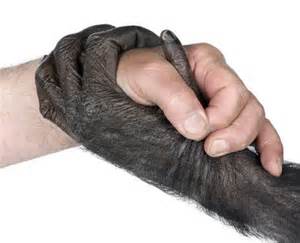Yuval Noah Harari: NYT Bestselling Israeli historian. Pof. Harari writes some interesting books about humans: popular and entertaining chronicles of our history and possible future. As a PhD and Professor of History at Hebrew University of Jerusalem he is certainly well educated in human history. Besides being a best-selling author, and a well-published historian, he is also admirably, an activist for democracy and science. But as far as knowledge of animal behavior, neuroscience, cognitive science, and human evolution he is decidedly off his turf.
His 2015 TED talk has garnered over 9 MILLION views. In it, he claims there is nothing special about human individuals and their brains; according to the good professor our bodies and brain are largely equivalent to those of a chimpanzee.
He could not be more wrong.
He feels we were mostly a rather insignificant critter up thru 70,000 years ago – and that any real impact we started to make on the planet didn’t occur until after that time. I might disagree somewhat with that characterization of hominins at 70K BP., but we will get to that later. In all actuality though, the differences he emphasizes throughout the talk – such as building pyramids, starting religions, exchanging goods with money and banking, developing legal and political systems – really didn’t occur for another 65,000 years – after 5,000 BP, beginning in the late Neolithic.
But that’s not my main gripe. Being a historian, he really should get the dating of such accomplishments correct for his audience, but what I take greater exception to is his utterly exaggerated capabilities of the chimpanzee, and his claimed near equivalence of our individual selves in brain and body to other animals, especially our closest genetic cousin – the chimp:
Harari:
“Usually we look for the difference between us and all the other animals on the individual level.
“We want to believe…I want to believe…that there is something special about me, about my body, about my brain, that makes me superior to a dog or a pig or a chimpanzee. But the truth is, on the individual level, I’m embarrassingly similar to a chimpanzee”
The ignorance of that statement is more than appalling.
And that statement is made in support of his thesis that our formidable social skills are what is paramount in human accomplishment: that it is only our level of social interactions that make us different- When in fact, it IS our individual cognitive and physical abilities (which enable our uniquely human social interactions) – that have produced all the complexities of modern civilization he emphasizes throughout the talk. Like I said, he should stick to History.
We are individually, so far beyond pigs, dogs, and yes, even chimps in our bodies physical abilities, and especially our brain’s cognitive abilities – that already by 70,000 years ago- there is no comparison. Our HUGE differences ARE at the individual level: each human is born with a uniquely configured human brain-which is a pattern-seeking, concept-forming, information sponge…qualitatively different in cognition than any other animal, which underlies all our success and impact on the environment – and those cognitive differences are what produce our unique social skills.
This ridiculous need of many social scientists today to make certain we never admit we may have evolved cognitive skills that surpass other animals, and qualitatively so – is breath-taking in its absurdity. Harari carries it to new heights in his 2015 TED talk.
He makes the obligatory supplication to our social skills and ignores the intellect that fuels them. Without our uniquely evolved cleverness, there would be nothing to talk about, and no pyramids, religions, money, laws, or political systems – or science.
The absurdity is compounded by his further assertion:
Harari again:
“I guess if they took almost any one of you, and placed you alone with a chimpanzee on some island, the chimpanzee would do much better”
That claim floored me…
His claiming of superiority of the chimp over a human stuck on a deserted island is not merely a tad ridiculous – its just plain wrong. When people get off their turf and expound outside their disciplines – this is what happens.
Lets start with our bodies being different. Being bipedal, and hairless, we can walk long distances to forage for food, and run down game or track animals for miles, and thereby have a fighting chance to procure food on said deserted island. Chimps would collapse in a panting sweat (like your overheated dog), with such exertions. Foraging in the hot sun across miles of island, without the shade of a tropical jungle canopy would not be in the chimp’s repertoire. And the human could fashion a palm-frond or some other piece of vegetation to serve as a hat to block out the harsh rays of the sun.
More importantly, unless the island had equatorial African fruits – edible, appealing, and recognizable to chimpanzees – the chimp would be SOL when it came to having ANYTHING to eat. There might be a few such islands, but the vast majority of islands around the globe would have little to nothing a chimp could eat. As dedicated frugivores, eating fruits and berries and leaves with the occasional termite or rare helping of baby monkey meat, the chimp is so highly adapted to their tiny band of central African forests and savannas, it wouldn’t know how or where to start in too different an environment. That’s why they are nearly extinct – restricted to eating only what is in their tiny slice of Central Africa. It is evident, that they have never successfully ventured into other environments. This is a creature highly adapted to one specific environment and food sources, and in 6 million years really hasn’t shown any ability to live anywhere outside of its home range.
Humans, on the other hand can and have lived just about anywhere.
My money wouldn’t be on the chimp.
Humans, unlike the food restricted chimps, are omnivores and global opportunists. We occupy the cognitive niche-allowing us to problem solve and adapt to damn near any environment-using our uniquely evolved cognition. The human on the island- with their physical abilities to forage for, extract, and process all sorts of foods, and a brain that allows us to search for and identify things to sample and eat- could find fruits, berries, crack open coconuts, dig roots, eat fish and shellfish, forage for bird and reptile eggs, snare reptiles and snakes, and devise clever means to trap and catch small mammals, birds, crabs, turtles, etc., etc.
None of these foods would be readily accessible to the chimp, nor would they have any notion of how to procure them on their own. They might eat some of these foods in captivity, but only if a human provides it for them.
Even tropical islands can get pretty chilly at night, and the ability to make shelter, primitive clothing, and especially fire, would be vital to survival as well in allowing a way to stay warm and dry, and cook food, allowing for even more food source exploitation. Using fire and cooking was something humans had been doing for nearly a million years by 70,000 years ago.
The first cold rain and the chimp would be fucked.


Continuing with the differences in body and brain that all human individuals possess, can a chimp make the ulnar grip? No. He cant touch his puny thumb to his pinky and make a full fist power/baton grip, or our precision grip, which we could use to manipulate all sorts of objects to enhance our survival; such as fashion sharp stone tools, whittle a stick to dig for roots and tubers, make twine, grab whole branches and logs to build shelters and make fires for our survival…the chimp is helpless in this regard. The differences in our bodies and brains would be huge to our survival over a chimp.

AND the human can swim. Chimps cant swim. They avoid water, so wading in the surf or creek or river to forage for food is out as well. They tend to shy away from water sources and couldn’t take advantage of either ocean tidal pools, or riverine environments to procure food, like a stranded human certainly would. We can collect both freshwater and ocean tidal critters -the chimp wouldn’t venture out to find anything, and wouldn’t eat it if he could. Humans have a plethora of options the chimp doesn’t have.
Harari continues:
“the real difference between humans and all other animals-is not on the individual level: its on the collective level”
That’s the narrative that must be maintained – and its wrong as well.
As far as our brains, it is our individual cognitive skills, which we are wired at birth to develop, and which all normally raised children acquire in childhood, that allow for our collective skills – not the other way around. We have evolved to be qualitatively different in cognition: with problem-solving skills, trial and error learning, and eventually theoretical science. We can figure out all sorts of things individually – that we then share with others. It is not solely collective learning and info sharing that makes us different. It is each individual human’s ideas and solutions THAT WE THEN SHARE that give us our unparalleled accomplishments as an information sharing civilization.
The human on the island can think: “How do I ATTACH this VINE to this LIMB to secure the ROOF of my SHELTER?” The chimp knows none of these concepts – neither the objects nor the specific actions on them. Even the most citified of humans without training in survival skills, would attempt to build a shelter- using the human hand grips and their bipedal body leverage to employ the concepts in the above thoughts – and successfully build a shelter to keep out the wind and the rain – however primitive. The chimp would have no way – physically or mentally to achieve anything resembling the most basic survival techniques a thinking human would.

In addition, where Dr. Harari could have also done his homework is this: there have been thousands of humans who have lived in isolation over the millennia, from religious hermits to shipwrecked, exiled, and otherwise marooned castaways who survived many years on deserted islands, to solitary individuals who have chosen to live “off the grid” (in modern terms), and fend for themselves in every culture and every period throughout human history. Such human isolates have survived in every environment imaginable from deserted tropical islands, to islands and territories in temperate zones with significant change of seasons and weather, even to harsh, Arctic climates.
Chimps would have a real tough time existing for too long anywhere outside their equatorial home range: human individuals on the other hand, have survived in just about every environment possible, for weeks, months, even years, before dying or being rescued.
The story of Alexander Selkirk, a marooned castaway and the inspiration for the Robinson Caruso novel is but one example:
“Selkirk was left to fend for himself until his eventual rescue, which wouldn’t come for over four years. During that time, he survived by hunting lobster and crawfish, foraging for food, building fires and huts to provide shelter, and fashioning weapons and clothes.” https://allthatsinteresting.com/alexander-selkirk
Think a chimpanzee could manage any of that?
My money wouldn’t be on the chimp anytime, anywhere.
Stick to your history, pal.
Humans, by 70,000 years ago, despite Prof. Harari’s claims that we were no more significant than jellyfish, fireflies, or woodpeckers – “minding our own business in a corner of Africa” – had already spread far out of Africa across much of the world in a series of migrations starting nearly 2 million years prior. As a Historian who writes extensively on the human condition, he ought to clue his audience in that fact as well. Modern humans (Homo sapiens), did leave Africa after 70,000 years as he emphasizes, but earlier Homo species had left our home continent already, and a number of times.
We first left Africa by at least 1.8 million years ago, and by 70,000 years ago had populated all of Africa, much of Europe including the British Isles, most of Asia, including China, India, Indonesia, and by then almost into Australia (woodpeckers and fireflies never made it down under). Jellyfish do populate the entire world’s oceans but I’d agree their impact on the planet was as negligible as birds or insects, but humans had already been making stone tools for nearly 3 million years, regularly hunted large animals, forged wooden spears, built shelters, had produced beads and shell ornaments, and left the first evidence of geometric inscriptions: Cave Art would soon follow.
No other critter does any of this…much less much later build skyscrapers and make you a hamburger!
The firefly, woodpecker, and jelly fish, are all like the chimp; stuck in their ancestral environments, adapted specifically to them and quite successfully for millions of years, but we had already evolved by the Late Paleolithic to problem-solve our way in nearly any environment and had populated 3 continents on the way to a 4th (Australia) and the 5th and 6th (the Americas) not long thereafter.
I would agree with Prof. Harari that as of 70,000 years ago, we had not changed the landscape anywhere near as much as in the last 5,000 years of civilization with its monumental architecture, cities, countries, global trade, our phenomenal population explosion, and now even climate altering manufacturing, transportation, power, and heating residues. But we were already doing things no other animal has ever done – hardly unimportant. Language and cultural exchange was already in place- trade over 100’s of miles, ornamentation and art, etc., etc. I think we were already making an impact on the planet, however insignificant compared to later times, that was wholly unlike sea creatures, insects, or birds.

From a rather bleaker perspective, besides our ability to eat almost anything on the “lonely island” that the chimp couldn’t,- we could club or spear the chimp, then skin, roast, and eat him as well- not the other way around. People in many cultures regularly eat other primates; mostly monkeys, and yes, the occasional chimp is taken for bush meat.
SO, we are decidedly different, more adaptable, and cognitively advanced both INDIVIDUALLY and COLLECTIVELY than the other animals. It doesn’t have to entail we are superior or have some claim to dominion, but we are different – and its OK to say so.
Harari spends a lot of time in the TED talk explicating how our institutions and our human social/collective behaviors such as money and trade, which are absolutely essential to our modern global civilization, are just ideas, fictional entities: and in the process of doing so he makes the claim that chimps trade food:
“Chimpanzees trade, of course: “Yes, you give me a coconut, I’ll give you a banana.” That can work.”
I researched that proposition as well, and I suspect it is as bogus as his other off-the-cuff pronouncements. Firstly, chimpanzees probably don’t eat a lot of coconuts, if at all when not fed them in captivity: they are not native to Africa and were introduced only in the last few centuries. They tend toward soft fruits, leaves, shoots, etc. I couldn’t find anything demonstrating the trade/exchange of foodstuffs- one item for the other. Chimps forage communally but eat individually and don’t feed each other, even their offspring are left to collect whatever scraps they can. Chimps only SHARE their food (not exchange it) with allies who might share their food with them later, AND if they do exchange it is meat – for sex. Males will share meat with females, in exchange for sex, not for a banana. So trading a coconut for a banana seems more than unlikely and just another spontaneous and not-well thought out and un-researched bit of fantasizing on the good Professor’s part. Harari, as a trained academic, especially as an Historian who are generally known for their persnickety-ness when it comes to research and references – should know better.
Harari really wants us to believe its our communication and social abilities that make all the difference:
“…we can work together to create this global exchange of IDEAS. (emphasis mine) This is something chimpanzees cannot do.”
Harari and most social scientists and commentators would agree it is the exchange of ideas that is key here and I agree wholly that our collective learning and communication of ideas is utterly important, but there is something more fundamental that makes the real difference between us and the chimps and all other animals as well: the kind of ideas we hold themselves. Chimps not only cant exchange them (any more than coconuts for bananas) they don’t HAVE them- our kinds of ideas, that is.
Ideas are defined as the product of thought, mental representations of objects, but also of courses of action, purposes, relations, and both real and imagined entities – and especially unobservable abstract relations. I’ll grant the chimp and other animals as having thoughts, with simple problem solving abilities, and mental representations of objects based on perceptual similarities. No argument there.
But other animals, including chimps do not have human concepts, ideas which go beyond perceptually similar objects and similar looking (and smelling) living things.

Humans, even your one-year-old, can represent abstract relations such as containment, weight, propulsion, support, contact, solidity, and many many others thru early childhood which will eventually include ideas of imaginary objects and entities, courses of actions, purposes, and so on. Chimps and other animals show no capacity for anything beyond basic perceptual ideas. Your young one can make the “allgone” gesture referring to all sort of situations where something is missing, an absence of containment, and understand weight and propulsion and a whole host of abstract relations. It is those ideas that make us qualitatively different in our cognition and enable all the wonderful things we take for granted in our modern world. It because we can entertain such ideas in the first place that makes us wholly different, not just our ability to exchange them, share them, build our world with them – once someone has thought of them in the first place. Good ideas originate in one person, one individual or another, and then are spread to others.
We have ideas on how to do things, how processes work, how to solve problems, how one thing is related to another. It is those kinds of ideas that make us different, and it is those sorts of abstract entities and relations that we exchange to build our modern world.
That’s what makes us different. Without that ability, we would have only simple ideas to exchange. It is not so much the exchange, as the kinds of ideas that only we possess and then exchange, that make all the difference.
The main thrust of the remainder of his talk is how entities we rely on to run modern civilization and our prodigious and ubiquitous social interactions aren’t real-and exist only in our imaginations. I take exception with that pitch as well. Money is real and its value is in our agreed upon behavior and time – which both have value. The behaviors that money, and laws, political and business organizations mediate; our actual exchanges and relationships, are very real.
And he is dead wrong about the US, Google, or the World Bank existing only in our imaginations – just like religious claims and gods. Those 3 entities describe human agreements and complex interactions that drive very real behaviors that do exist in the real world.
Gods don’t exist, but Google does…and religions are fantasy. Chimps exist too – but not for long on lonely islands.
(61)
